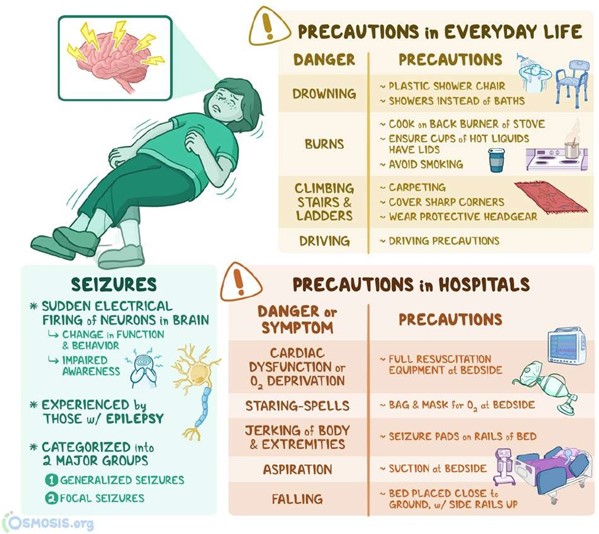A nurse is caring for an adolescent who has hyperthermia. Which of the following actions should the nurse take?
Cover the adolescent with a thermal blanket.
Submerge the adolescent’s feet in ice water.
Initiate seizure precautions.
Administer oral acetaminophen.
The Correct Answer is C

Hyperthermia is a condition in which the body temperature is abnormally high, usually due to exposure to heat, infection, or certain medications. Hyperthermia can cause neurological complications, such as seizures, confusion, or coma. Therefore, the nurse should initiate seizure precautions for an adolescent who has hyperthermia to prevent injury and protect the airway.
Choice A is wrong because covering the adolescent with a thermal blanket would increase the body temperature and worsen hyperthermia. The nurse should remove excess clothing and use cooling measures, such as fans, ice packs, or cool fluids.
Choice B is wrong because submerging the adolescent’s feet in ice water would cause vasoconstriction and shivering, which would reduce heat loss and increase heat production. The nurse should avoid using extreme cold or ice water to cool the body.
Choice D is wrong because administering oral acetaminophen would not be effective for hyperthermia caused by non-infectious factors, such as heat exposure or medications.
Acetaminophen lowers the body temperature by reducing the hypothalamic set point, which is not altered in hyperthermia. Additionally, oral medications may be difficult to swallow or absorb in a hyperthermic patient.
Normal body temperature ranges from 36.5°C to 37.5°C (97.7°F to 99.5°F). Hyperthermia is defined as a body temperature above 38.5°C (101.3°F).
Nursing Test Bank
Naxlex Comprehensive Predictor Exams
Related Questions
Correct Answer is B
Explanation
Choice A rationale: Adjusting medication times based solely on convenience violates the prescribed dosing interval, which is essential for maintaining therapeutic drug levels and preventing antibiotic resistance or toxicity.
Choice B rationale: Facility policies typically allow a "grace period" for non-time-critical medications, usually 30 to 60 minutes before or after the scheduled time, to ensure safe and timely administration.
Choice C rationale: Administering a medication 2 hours late significantly deviates from the prescribed schedule, potentially causing the drug's plasma concentration to fall below the minimum effective level required for treatment.
Choice D rationale: Increasing the infusion rate of vancomycin is dangerous and can cause "Red Man Syndrome," a hypersensitivity reaction characterized by flushing, rash, and hypotension due to rapid histamine release.
Correct Answer is B
Explanation
The correct answer is Choice B
Choice A rationale: Inserting the catheter without applying suction is correct technique. Suction should only be applied while withdrawing the catheter to prevent mucosal trauma and hypoxia. Initiating suction during insertion can damage tracheal lining and cause bradycardia due to vagal stimulation. Allowing clean insertion without suction reduces injury risk and supports effective secretion removal on withdrawal with controlled suction time.
Choice B rationale: Waiting 2 minutes between suction passes is too long and may delay secretion clearance, risking hypoxia and secretion buildup. Best practice is to wait about 30 seconds to 1 minute or until the client recovers baseline oxygen saturation and heart rate. Prolonged intervals may lead to atelectasis or respiratory distress in patients with poor reserve, especially if suctioning is incomplete or secretions are copious.
Choice C rationale: Suctioning should be limited to 10–15 seconds per pass to reduce hypoxemia and bronchospasm risks. Applying suction for 15 seconds falls within the upper acceptable range, particularly if preoxygenation is done. Extended suction beyond this can decrease PaO₂ levels rapidly. Limiting the suction time ensures safer removal of secretions while minimizing trauma and preserving adequate oxygenation.
Choice D rationale: Encouraging the client to cough facilitates mobilization of secretions toward the upper airway, making suctioning more effective. Coughing also enhances airway clearance naturally and may reduce the number of required suction passes. It is a therapeutic action in tracheostomy care that supports pulmonary hygiene, helps prevent atelectasis, and can reduce the need for deep suctioning interventions.
Whether you are a student looking to ace your exams or a practicing nurse seeking to enhance your expertise , our nursing education contents will empower you with the confidence and competence to make a difference in the lives of patients and become a respected leader in the healthcare field.
Visit Naxlex, invest in your future and unlock endless possibilities with our unparalleled nursing education contents today
Report Wrong Answer on the Current Question
Do you disagree with the answer? If yes, what is your expected answer? Explain.
Kindly be descriptive with the issue you are facing.
